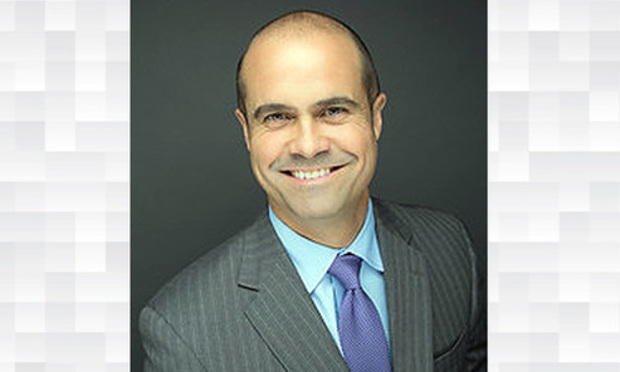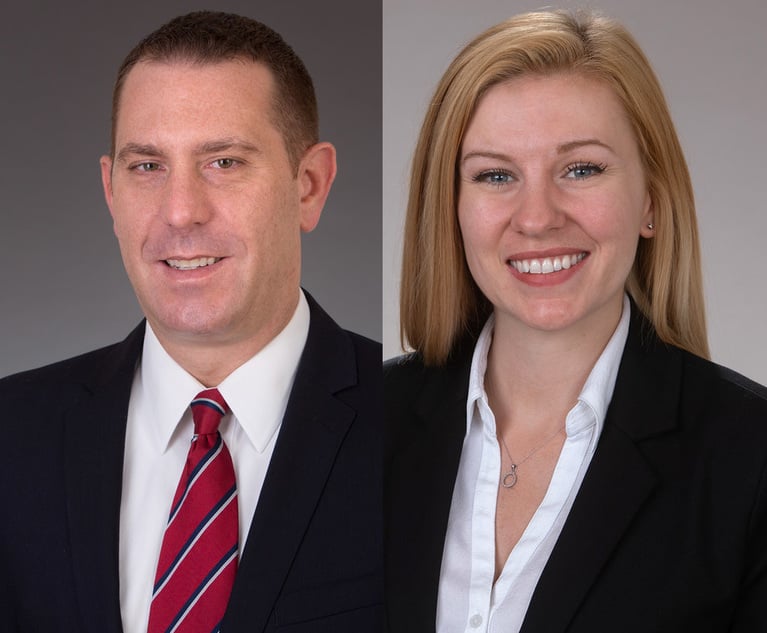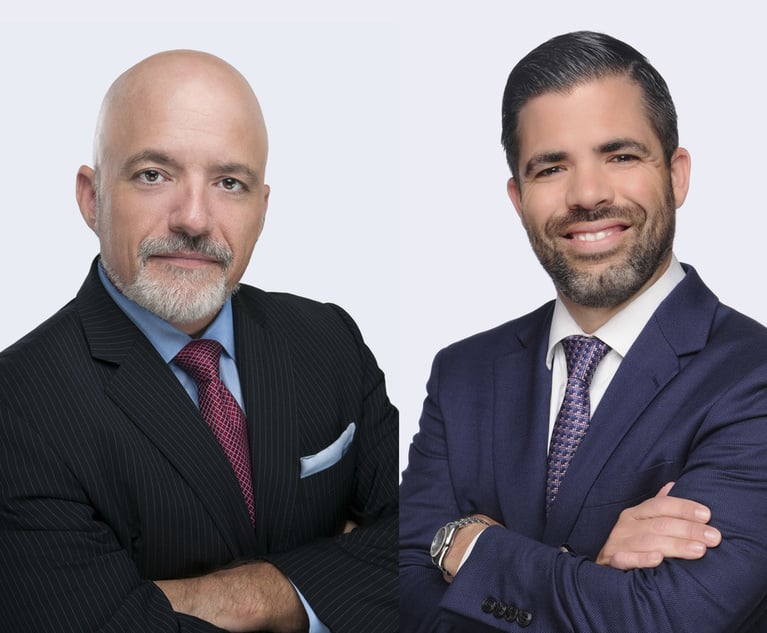The Challenge of Retaining Top Young Talent for Law Firms (And Not Breaking the Bank)
Paul O. Lopez, the head of Tripp Scott, offers suggestions — beyond money — for retaining young attorneys.
October 07, 2019 at 08:00 AM
10 minute read
 Paul Lopez, Tripp Scott
Paul Lopez, Tripp Scott
Long ago in a galaxy far away, a law school graduate would join a law firm as an associate and, if things progressed as planned, would eventually make junior partner, then make senior partner and would hopefully enjoy a long career at the same law firm.
Those times are long gone (if they ever truly existed). Today those of us who are managing law firms know that our young associates are getting barraged with calls from legal recruiters and headhunters from other industries every week attempting to entice them with the promise of a bigger better deal. We also know that young associates, who are millennials and who have access to more bandwidth of information than at any time in human history, have a different perspective on their career options.
Where historically a young lawyer from my generation might realistically only consider the prospect of going to a different law firm for more money and to work on bigger cases, today's generation of young lawyers is open to endless possibilities of career moves, from going in-house to joining a private equity firm or even working for a startup that is developing the next app that will change the world.
So how do law firms compete with all of these possibilities and options that young lawyers now face? Well, one way is to acknowledge that this is our new reality and accept it. It is what it is, as they say. Now, against this backdrop of our new reality, there are certain key steps that law firms can and should take in order to do as much as is reasonably possible to retain their young top talent.
Meaningful Work
While conventional wisdom used to be that if you made sure that your top talent was taken care of financially, the law firm had nothing to worry about. However, that is a mistake in today's environment, and money is usually the least important factor in connection with employee satisfaction.
What is becoming evident with millennials is that, while money is certainly important, today's young lawyer is looking for something more. They are looking for real challenges and having real input into solving the client's legal problems.
Law firms need to ensure that they are giving their associates meaningful projects and assignments. Including associates early on in cases, from evaluating the case to making decisions along the way throughout the course of case, will ensure that they feel that the law firm is affording them the respect that they deserve. This can go a long way toward cementing the relationship your associate has with your law firm.
Decision Making
Numerous studies show that people are much more receptive to decisions made in the workplace when there is true buy-in. But what does that really mean? Generally buy-in involves including individuals throughout the decision-making process so that there is input and debate about a particular decision.
They do not necessarily have to agree with the decision, but simply including them in the process can assure greater support for the ultimate choice that is made. Whether it relates to what online research platform the law firm is going to use, what type of document management software might be procured or what court reporter agency the law firm should use, including young associates in these types of decisions can undoubtedly build their sense of ownership in the law firm, which should lead to more loyalty. Additionally, it is generally harder to walk away from something that you felt you played an important role in developing.
Cultivating Bonds
Law firms traditionally held expensive retreats for everyone to get together once a year under the misguided belief that this would lead to camaraderie. Oftentimes, one-third of the people in attendance were not enjoying themselves, another third was probably drinking too much to truly connect with anyone, and the other third were off doing their own thing, running counter to the overall goal of the retreat.
We have all witnessed some version of these examples. What might make more sense is to have bi-monthly or quarterly events in a smaller setting and invite (not demand) associates to participate. The events could include bowling nights, escape rooms, extreme go-karting or any type of activity that allows young lawyers to work together in the spirit of competition and strategy.
Holding these types of events more frequently and making them voluntary should lead to more real bonds being forged between the associates. It goes without saying, but it is usually harder to leave a place where the relationships are meaningful and deep, and creating an environment which fosters these types of relationships is critical.
Originations
As many of us know, clients are the lifeblood of law firms. Without them, there is no law firm. And certainly, while no law firm expects its young associates to drive in meaningful business, it is important to start instilling in young associates the importance of developing business so that they grow and mature into profitable partners.
One way a law firm can do that is to have partners share some origination credit with young associates and factor that in to the associates' year-end bonus compensation. It does not have to be significant, but enough that the firm is encouraging young associates to recognize the value of providing great quality legal services for the clients and how important maintaining those relationships is to the financial health of the firm.
While there are many different ways that law firms compensate their associates, the key is to come up with some level of incentive which gives young associates a sense of ownership of the clients and their ability to increase their compensation.
Show Flexibility
Today's millennials enjoy the ability to set their own working hours. They did not grow up in the era of traditional 9 a.m. to 5 p.m. workdays (not that these are normal hours for lawyers, but you get the point). The traditional workday appears to be fading into the past as technology has developed, and more and more lawyers are telecommuting to do their jobs.
Because of this, law firms should show some flexibility with associates after their first few years of practice and afford them the ability to work remotely so long as they are doing a first-rate job on their assignments.
Obviously, some of these types of decisions will need to be made on a case-by-case basis, but demonstrating this type of flexibility with your young lawyers should foster the type of loyalty that will make it difficult for your lawyers to seek utopia elsewhere.
Mentoring
Another key component to associate satisfaction is determined by whether they feel that they are being properly trained and mentored. The practice of law can be undoubtedly difficult at times, and it is important that law firms implement either formal or informal mentoring platforms which provide associates with sounding boards that they can bounce ideas off of in difficult cases or scenarios.
Further, your law firm should provide young lawyers with clear guidance on how to advance within the firm. If young lawyers feel as if they are rudderless in your law firm, it will clearly be easier for them to decide to leave. However, if they feel that the law firm earnestly cares about their development as a lawyer and their progression within your law firm, it will be much harder for that person to decide to leave to pursue other opportunities.
Support Sponsorship
Having the law firm's top young talent getting involved in your local, state and federal bar associations is important. Make sure that you instill the importance of this in your young attorneys and financially support their involvement in these types of organizations. Similarly, if they are showing interest in joining philanthropic boards and really getting involved, the law firm should zealously support and encourage that type of initiative.
A law firm should financially support these types of activities not only because it is important for the law firm to showcase its top talent. Your young associates will be grateful for your support and hopefully develop the fealty you want from them when they are getting those calls from recruiters.
Money
When all else fails, throw money at the problem. No, just kidding; well, only partially kidding. Finances are certainly important to young millennials. With law school loans, undergraduate loans, weddings, young children, mortgages and car payments, there is no doubt that money is important to young associates.
However, I intentionally mention this topic last since most studies show that money tends to be the least important factor with most employees' satisfaction with their jobs. Yes, it is important, but oftentimes what drives people out of their jobs are the nonmonetary issues within the workplace.
That said, law firms do have to be vigilant about market conditions to make sure that they are keeping pace with their competitors on compensation packages. This includes understanding what types of benefits are customary in your market.
The goal is to strive to be competitive. That does not mean that your law firm has to match the highest salaries in your market for comparable associates, but what it does mean is that your compensation package should be within striking distance and flexible enough that young top talent will recognize that, given all of the nonmonetary considerations, they are in great environment to thrive and to succeed in the long term.
Key Issues
Clearly, this is not an exhaustive list of suggestions to retain top young talent, but they are some of the key issues that many of us see day to day in managing law firms in the South Florida marketplace.
What is crystal clear is that a law firm that fails to even consider these types of issues is doomed to fail. Law firms expend significant resources on campus interviews and legal recruiting in general, and then law firms spend significant dollars and time training their young lawyers to mature and progress.
If a law firm does not spend meaningful time taking steps to protect these investments, they may very well lose them. Yes, clients are the lifeblood of a law firm, but top young legal talent is the lifeblood of the future of your law firm, and ignoring that fact is a dire mistake.
Paul O. Lopez is the chief operating officer and head of litigation at 50-attorney, 50-year-old Tripp Scott in Fort Lauderdale.
This content has been archived. It is available through our partners, LexisNexis® and Bloomberg Law.
To view this content, please continue to their sites.
Not a Lexis Subscriber?
Subscribe Now
Not a Bloomberg Law Subscriber?
Subscribe Now
NOT FOR REPRINT
© 2025 ALM Global, LLC, All Rights Reserved. Request academic re-use from www.copyright.com. All other uses, submit a request to [email protected]. For more information visit Asset & Logo Licensing.
You Might Like
View All


Kirkland & Ellis Taps Former Co-Chair of Greenberg Traurig’s Digital Infrastructure Practice
3 minute read
Trending Stories
- 1Judge Sides with Retail Display Company in Patent Dispute Against Campbell Soup, Grocery Stores
- 2Is It Time for Large UK Law Firms to Begin Taking Private Equity Investment?
- 3Federal Judge Pauses Trump Funding Freeze as Democratic AGs Launch Defensive Measure
- 4Class Action Litigator Tapped to Lead Shook, Hardy & Bacon's Houston Office
- 5Arizona Supreme Court Presses Pause on KPMG's Bid to Deliver Legal Services
Who Got The Work
J. Brugh Lower of Gibbons has entered an appearance for industrial equipment supplier Devco Corporation in a pending trademark infringement lawsuit. The suit, accusing the defendant of selling knock-off Graco products, was filed Dec. 18 in New Jersey District Court by Rivkin Radler on behalf of Graco Inc. and Graco Minnesota. The case, assigned to U.S. District Judge Zahid N. Quraishi, is 3:24-cv-11294, Graco Inc. et al v. Devco Corporation.
Who Got The Work
Rebecca Maller-Stein and Kent A. Yalowitz of Arnold & Porter Kaye Scholer have entered their appearances for Hanaco Venture Capital and its executives, Lior Prosor and David Frankel, in a pending securities lawsuit. The action, filed on Dec. 24 in New York Southern District Court by Zell, Aron & Co. on behalf of Goldeneye Advisors, accuses the defendants of negligently and fraudulently managing the plaintiff's $1 million investment. The case, assigned to U.S. District Judge Vernon S. Broderick, is 1:24-cv-09918, Goldeneye Advisors, LLC v. Hanaco Venture Capital, Ltd. et al.
Who Got The Work
Attorneys from A&O Shearman has stepped in as defense counsel for Toronto-Dominion Bank and other defendants in a pending securities class action. The suit, filed Dec. 11 in New York Southern District Court by Bleichmar Fonti & Auld, accuses the defendants of concealing the bank's 'pervasive' deficiencies in regards to its compliance with the Bank Secrecy Act and the quality of its anti-money laundering controls. The case, assigned to U.S. District Judge Arun Subramanian, is 1:24-cv-09445, Gonzalez v. The Toronto-Dominion Bank et al.
Who Got The Work
Crown Castle International, a Pennsylvania company providing shared communications infrastructure, has turned to Luke D. Wolf of Gordon Rees Scully Mansukhani to fend off a pending breach-of-contract lawsuit. The court action, filed Nov. 25 in Michigan Eastern District Court by Hooper Hathaway PC on behalf of The Town Residences LLC, accuses Crown Castle of failing to transfer approximately $30,000 in utility payments from T-Mobile in breach of a roof-top lease and assignment agreement. The case, assigned to U.S. District Judge Susan K. Declercq, is 2:24-cv-13131, The Town Residences LLC v. T-Mobile US, Inc. et al.
Who Got The Work
Wilfred P. Coronato and Daniel M. Schwartz of McCarter & English have stepped in as defense counsel to Electrolux Home Products Inc. in a pending product liability lawsuit. The court action, filed Nov. 26 in New York Eastern District Court by Poulos Lopiccolo PC and Nagel Rice LLP on behalf of David Stern, alleges that the defendant's refrigerators’ drawers and shelving repeatedly break and fall apart within months after purchase. The case, assigned to U.S. District Judge Joan M. Azrack, is 2:24-cv-08204, Stern v. Electrolux Home Products, Inc.
Featured Firms
Law Offices of Gary Martin Hays & Associates, P.C.
(470) 294-1674
Law Offices of Mark E. Salomone
(857) 444-6468
Smith & Hassler
(713) 739-1250






